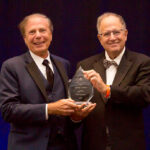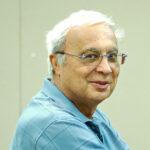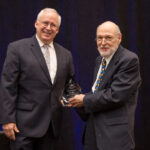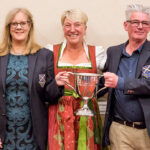Six inducted into Hall of Fame
Last evening, the ACBL Bridge Hall of Fame held its first induction ceremony in three years after a COVID-inspired hiatus. Six new members were added to the prestigious body – three posthumously – and the latest recipient of the Sportsmanship Award was also named.
The inductees for the Open Award were Marty Bergen, Larry Cohen and the late Lynn Deas. National Tournament Director Sol Weinstein received the Blackwood Award, while Beth Palmer and John Sutherlin (both deceased) were recipients of the von Zedtwitz Award.
Scotland’s national team was collectively named as the recipient of the Lazard Sportsmanship Award.

Larry Cohen is inducted into the Hall of Fame by longtime partner David Berkowitz.
Larry Cohen, a 25-time NABC champion, author and teacher of Delray Beach FL, was presented by longtime partner (and emcee for the evening) David Berkowitz. In addition to Berkowitz, Cohen, the author of the influential “To Bid or Not to Bid: The LAW of Total Tricks,” formed highly successful partnerships with Ron Gerard and fellow inductee Bergen.
“Larry and I go way back,” began Berkowitz. “He came to me and said, ‘I gotta know what kind of partner you’re going to be. I grew up with Ron Gerard; when Ron Gerard opened 2S, he had the king, the queen, the jack the ten, the nine and the eight and maybe a few more. When Marty Bergen opened 2S, the opponents could make 6S!’ Which was true. And he says, ‘Which one are you?’ I said, ‘Which one do you want me to be?’ And I think he said, ‘Be yourself, I just need to know what you’re going to have.’ That’s all he wanted to know, was what he could rely on.”
Berkowitz said he would be somewhere in between. “Of course, you could drive a truck in between those two.”
Berkowitz described Cohen as an overachiever. “Playing with him was a terrific honor. When he would go into a study, no matter what happened, he would always get it right. He would always play the card that you wanted him to play. He would always make the bid you wanted him to bid. He was unbelievable, uncanny. He trained me to be a good partner; he wanted us to be respected.
“Everyone rooted for Larry. He’s everything that’s good about bridge.”
Larry started off by thanking the two people seated next to him: his wife, Maria and his brother, Paul. “I learned bridge when I was six, from my grandparents. If they could be here tonight, you wouldn’t believe it, they were incredible. Fortunately, they lived long enough to see my success in bridge, and they were so proud of me.
“We had a fourth, who was my older brother. He’s a very good player, he’s been my best friend and we’re so close.
“I kind of want to conclude with what’s the most important part of bridge for me. There are two tables over here, and at those two tables are players who have been on cruises with me – students – and that’s what I live for in bridge. The thrill of teaching and people having a good time at bridge. I’ve enjoyed that more than my career as a player. And it’s so special to me to enjoy that form of bridge and getting people interested in the game and loving the game. I love this game, it’s been my life. It’s such an honor.”

Marty Bergen
Prolific author, bidding theorist and 10-time NABC champion Marty Bergen of Palm Beach Gardens FL was presented by longtime partner (and fellow inductee) Larry Cohen. The pair were a dominant force in top-level bridge in the mid-’80s. Bergen’s informed, aggressive style in the bidding has influenced generations of players.
Cohen described his first meeting with Bergen in the 1970s when, as a teenager, Cohen went to kibitz Bergen at a tournament. On the very first hand, Bergen held five clubs to the jack and nothing else. He was in third seat at favorable vulnerability; as he would later hear Bergen often say, “Third seat favorable is not bridge.” Cohen was stunned to see Bergen open the hand 3C.
“This was the 1970s. I had learned you had to have seven good clubs to open 3C, not five lousy clubs. Marty was one of the pioneers of aggressive preempts, well ahead of his time,” Cohen said. “He really did revolutionize competitive bidding.”
Cohen called the award much deserved for Bergen’s achievements “as a player, a teacher, a writer and most of all, as an innovator.”
Bergen, who could not be present due to a health issue, accepted the award via video.
“I would like to believe one of the things I have made contributions to bridge is helping people evaluate hands,” Bergen said. “Unfortunately, in a world devoted to counting points, most of my ideas on hand evaluation have fallen on deaf ears. Oh, well.”
Though he hasn’t played much recently or since retiring in the early ’90s after a brief playing career, Bergen said, “My obsession with this game will never change.”

Lynn Deas
Lynn Deas was one of the greatest players in the world, winning nine gold medals in world-level pairs and team events, along with 27 NABC titles. Deas, who died in 2020, won many of her titles with fellow inductee Beth Palmer. Deas was presented by friends Sherry Spalding Fardie and Barb Doran.
Spalding Fardie was a friend and early bridge partner of Deas when they were in college. She talked about how their racket hustling backgammon players put her through graduate school.
“The history of bridge changed with her partnership with Beth Palmer,” she said. “I got to watch vicariously as Lynn and Beth and their team represented the U.S. in world championship after world championship.
“When her health became very precarious, we would play from a hospital bed. She played from a wheelchair. She traveled in her scooter all over the world, independently – never complaining. Never with self-pity. She was a champion in bridge and more importantly in life.”
“She was wonderful,” said Doran. “I will miss her for the rest of my life.”

Beth Palmer
With 29 NABC titles and eight gold medals in world championships, Beth Palmer, who died in 2019, was a formidable player. Her partnership with Deas was one of the most effective in the history of the game, especially in women’s competitions, where the duo was always among the favorites in the field.
Palmer was a recipient of the von Zedtwitz Award, given to individuals who have achieved prominence in the game of bridge and have an outstanding tournament record, but who may not have been in the limelight for a significant period of time. Palmer, of Chevy Chase MD, was presented by friend a frequent partner Bill Cole.
Getting good at bridge and developing a strong partnership are things that take a lot of time, Cole noted. Palmer, a notoriously slow player, was always willing to put as much time as necessary to achieve her goals – whether that be taking the maximum number of tricks on the hand in front of her or developing the strongest partnership possible with Lynn Deas.
“Beth’s goal was always to be the best she can be, whether it was playing hearts in college, bridge, or her career as an administrative law judge, for which she won awards,” Cole said. “Beth and Lynn dominated women’s bridge for 40 years in the U.S.”
Describing Palmer’s careful play, Cole said “She guarded against 4–1 breaks before she knew they were there.”

John Sutherlin
The late John Sutherlin of Dallas TX was a 13-time NABC champion and a winner of the World Senior Team Championship in 2000. He had numerous second-place finishes, as well, notably with his wife, Peggy, the first of which occurred before the pair were married. Their work in bridge administration, primarily in the role as longtime members of the National Appeals and Ethical Oversight Committees, prompted the ACBL to name them Honorary Members of the Year in 2008.
Along with Palmer, Sutherlin was a recipient of the von Zedtwitz Award. Sutherlin was presented by longtime friend and partner, Mike Passell, who recalled being introduced to Sutherlin in the mid-’80s by Paul Soloway because of their mutual interest in wagering on sports. “Little did I know that this would be the beginning of a four-decade friendship,” said Passell. “I was really happy when John asked me to play bridge and I found out what an incredible player he was. He was one of the greatest declarers and an even better defender. But we won’t talk about the bidding …”
Passell listed all of Sutherlin’s successes in tournament bridge, but noted, “He always told me his favorite thing he ever did was his second-place finish with his wife, Peggy, in the World Mixed Pairs.”
When Sutherlin was in the hospital recovering from a procedure, Passell visited his friend. He grew tired, and Passell was getting ready to leave. “He called me over, and he whispered because he was really tired, and he says, ‘can you get me down for $500 on the Cowboys?’
“It turned out this was the last time I spoke to John. We sort of started and ended our friendship the same way.”

Retired National TD Doug Grove presents the Blackwood Award to Sol Weinstein during the Hall of Fame induction ceremony.
National Tournament Director Sol Weinstein has been a senior member of the ACBL’s directing staff for decades. Weinstein, of Yonkers NY, is the recipient of the Blackwood Award, given to individuals who have contributed greatly to the game of bridge without necessarily being world-class players. Weinstein’s expertise in the Laws, tournament organization and director training have made him an indispensable part of the tournament experience in North America.
Weinstein was presented by retired National Tournament Director Doug Grove, who began with a list of Weinstein’s qualities provided by those who had work with Weinstein over the years.
“Relentless in trying to get things right. Competent. Reliable. The tournament chair never had to worry about things getting done right when Sol was in charge,” said Grove.
Acknowledging Weinstein’s role in the advancement of tournament technology, Grove said, “Sol is proud of his work on the earliest forms of electronic scoring in the ACBL.”
The respect Weinstein is accorded among expert players was also noted by Grove.
“Solly was up to the challenge of getting rulings right in high-level events,”
But Weinstein was equally engaged with helping newer players – and newer tournament directors – understand the rules of the game.
“For those who want to learn, Sol is here to teach.”
Closing with a line borrowed from the musical “Wicked,” Grove ended with “Sol changed us for the better, and he changed us for good.”
Weinstein’s remarks were modest and brief.
“I was totally shocked but pleasantly surprised by the Hall of Fame Committee’s selection,” he said, but added that he had been helped in his career by his association with the top players and tournament directors in the game.
“The best thing a TD can do is to get expert advice.”
Weinstein closed with a heartfelt thanks to his wife, Ann.
“You have put up with my directing schedule for so many years. I love you.”

Sabine Auken (center), presents the Lazard Sportsmanship Award to Samantha Punch and Stephen Peterkin.
This year’s recipient of the Sidney H. Lazard Jr. Sportsmanship Award was the national open team of Scotland in recognition of their refusal to seat a team against a squad with a convicted cheater on its roster in the 2021 European Championship qualifiers. Team Scotland’s principled objection initiated a cascade of refusals by other countries in the event to play against the offending squad.
Representing Team Scotland in Providence were squad members Samantha Punch and Stephen Peterkin. The award was presented by Sabine Auken.
Without directly referring to the offending member of the Italian squad that caused the boycott, Auken described the act of civil disobedience by Team Scotland by way of a literary reference to the Harry Potter novels.
“His black magic and dark spells were foiled by the Ministry of Bridge,” said Auken, who doubled down on the analogy by comparing the convicted cheater to the arch-villain of the Potter universe, Lord Voldemort.
“Voldemort was not welcome at the European Championships, but organizers could do nothing about it,” said Auken, setting the stage for Team Scotland’s plan to simply forfeit their first-round match against Italy rather than dignify the competition by sitting against a known cheater.
“News of the boycott spread like wildfire, and soon, all teams were refusing to play against the offenders, but it would never have happened if Scotland had not shown us the way.”
In accepting the award, Punch noted that the boycott was not without risk, as it exposed the Scots to possible sanctions from the European Bridge League as well as their own federation. But many players from around the world wrote to the Scottish squad during the competition to express their support.
“We were less worried about the consequences, and more concerned with doing the right thing. We were at the right place at the right time. Although refusing to play can be a serious offense, the particular nature of this situation made it clear what we had to do.”
